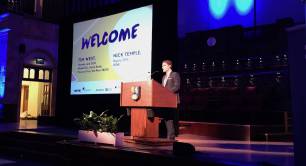How public investment can save farming post Brexit
Phil Moore presents a vision of sustainable farming – both for the farmers and for the environment.
The sun on your face, swallowing that good air and scanning the landscape unimpeded by the perimeters of a square-shaped screen are just some of the allures of the great outdoors. For new entrants to agriculture, getting their hands in the soil and growing honest, decent food is another.
But post Brexit the feasibility of farming will undoubtedly change. Any UK farming businesses over 20 hectares in size are often dependent on EU subsidies and non-agricultural sources of income.
And as a nation we rely heavily on food imports. Just over half of the food we ate in 2016 was produced in the United Kingdom (compared to almost 80% in 1984). How will cutting ties with the EU affect how we practice agriculture and how can social enterprises help to bridge the gap?
The resurgence in growing food ecologically, on a small-scale, may provide some interesting solutions to the coming changes in how land is managed and ultimately farmed. The Ecological Land Co-operative (ELC) is a community benefit society that is co-operative in structure. It has a simple mission: the creation of residential smallholdings helping new entrants to horticulture and mixed farming in England.
Ploughing such a path is rough terrain for many. New entrants to farming have little to no possibility of buying a farm in England: the cost of land and rural housing is simple too high. Yet these new entrants have the passion, vision and skills needed to reduce the negative environmental impacts of conventional farming. The ELC recognised this is a significant problem for new entrants to agriculture.
Helping source land, and provide the expertise and assurances to planners, the ELC has developed a model to ensure that exciting land-based businesses can get off the ground, unimpeded by the challenges of planning battles, and the energy and resources needed.
The ELC buys land and seeks planning permission for new residential smallholdings. They then sell the holdings, far below market value, on a long and secure leasehold creating new starter farms, protected for farming, for affordability, and for sustainability.
ELC’s vision is one where land is valued by supporting the growth of ecological agriculture (twinned with the benefits of increasing biodiversity and minimising pollution) and to ultimately revive the rural economy. Determined to turn good ideas into reality, to have a positive influence and to give hope to those choosing to live sustainably, the ELC has designed a model for creating affordable, ecological smallholdings which they hope to replicate and scale.
Their work is not possible without investment from their members. Having successfully developed their first cluster of farms in north Devon, and begun work on their second site in East Sussex, the ELC is demonstrating that small-scale ecological farming can, and does, work.
Sustainably managed smallholdings provide low-impact livelihoods, regenerate marginal land and produce good food for local communities; they also increase landscape resilience, and improve the ecology and biodiversity for future generations.
However, replication and scale takes investment and like many social enterprises ELC is looking at new ways in which they can access additional funding. Working in close collaboration with Ethex – the leading online positive savings and investment platform, ELC has launched a public share offer from April 3rd – 12th June to raise between £120,000 - £340,000 from retail investors who are keen to generate a social, environmental and financial return from their investments.
Anyone can purchase shares and people are invited to make purchases from upwards of £500. Supporting the ELC is not only about making more land available for a common good, but an investment in a working future — a future of sustainable land use, in harmony with the environment and for the creation of a living and working countryside.
To find out about the ELC and their work and how you can invest please visit https://www.ethex.org.uk/ecologicalland



